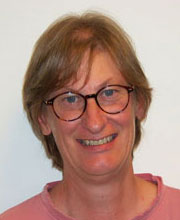Karen Vogtmann

503 Malott Hall
Ph.D. (1977) University of California at Berkeley
Research Area
Topology, geometric group theory
A fundamental technique for studying a group G is to view G as a group of automorphisms of a geometric object X. Geometric and topological properties of X can then be used to study algebraic properties of G. Beautiful classical examples of this are the theory of arithmetic and S-arithmetic groups acting on homogeneous spaces and buildings, including work of Borel and Serre on cohomological properties of these classes of groups, and the theory of groups of surface homeomorphisms acting on the Teichmüller space of the surface. I am interested in developing geometric theories for other classes of groups. In particular, I have worked with orthogonal and symplectic groups, SL(2) of rings of imaginary quadratic integers, groups of automorphisms of free groups, mapping class groups of surfaces, and automorphism groups of right-angled Artin groups. A particularly interesting geometric object called Outer space, which can be used for studying outer automorphism groups of free groups, is the subject of much of my research.
Selected Publications
Moduli of graphs and automorphisms of free groups (with M. Culler), Inventionnes 84 (1986), 91–119.
Cerf theory for graphs (with A. Hatcher), J. London Math. Soc. 58 part 3 (1998), 633–655.
Geometry of the space of phylogenetic trees (with L. J. Billera and S. Holmes), Advances in Applied Math 27 (2001), 733–767.
On a theorem of Kontsevich (with J. Conant), Algebr. Geom. Topol. 3 (2003), 1167–1224.
The cohomology of automorphism groups of free groups, Proceedings of the I.C.M. Madrid II (2006), 1101–1119.
Automorphisms of two-dimensional right-angled Artin groups (with R. Charney), Geometry & Topology 11 (2007), 2227–2264.
Actions of automorphism groups of free groups on spheres and acyclic manifolds (with Martin Bridson), Commentarii Math. Helv. 86 no. 1 (2011).
Abelian covers of graphs and maps between outer automorphisms of free groups (with M. R.. Bridson), Math. Ann. 353 no. 4 (2012), 1069–1102.